#i also love poetry anthologies
Text
i love anthologies. anthologies are so sexy
#in an alternate world where im an english lit major the norton anthology of english lit is my bible#it's by no means an exhaustive overview but i really love how everything is in its neat timeline#and you get a general vibe for how literature was back then as opposed to just going in blind. u see how everything influences everything#a major (maybe a bit irrational?) fear i have is i come out of a book w superficial understanding#and while that has contributed to unfortunate reading slumps i do also like this trait of me#where i am actually focused on giving a book/period of time the respect it deserves vs just reading it flippantly#i like doing my silly little pre-read of a period of time/author before jumping into it#i don't do pre-reads for everything but there are books where i find it necessary to prime my brain for absorbing them#and anthologies are good for that#and they're also a good resource for investigating authors whose vibe sits right w u.#or for knowing the general quaintessential authors of a certain genre of lit#i also love poetry anthologies#the commentary comparing/contrasting certain authors is also rly interesting to me . ok i'll shut up now#p
73 notes
·
View notes
Text
I just ordered the prettiest agate bookends for one of my bookshelves oh I can't wait
#lohst.txt#absolutely stunning#i mean all my bookshelves are#i love them#but apparently my family thinks im weird for organising my books alphabetical by author surname#like. im a librarian#what do you expect#although my shelves are organised in a certain way#there is one shelf that is just for all my non fiction books#i have one shelf thats dedicated to my poetry plays and anthologies (and my typewriter)#my fiction is spread over two- one in the living room and one in my room#the one in the living room also has lego#(van Gogh. lego mini flower pots. and the bonsai tree to be specific)#the one in my room also has my tarot collection. a painting i did. and lego succulents#oh! i keep forgetting about the shelf with all my riordanverse books#anyway i am going to post the agates when i get them
9 notes
·
View notes
Text
learning stuff at school: :D
having to actually write about it: :(
#french poetry is so good like it’s so much better than the gcse anthology#but i just like reading it i don’t wanna do a surface level analysis 💀#sociology is the same#love reading it but hate writing it#also i meant the gcse english anthology#forgot to say that
7 notes
·
View notes
Text
when your poetry portfolio ends up being 105 pages long
#it’s because my professor wanted 1) all drafts of all poems which was sixty pages#2) a clean copy of the final drafts which was 18 pages#and 3) a mini anthology of published poems we love and my intro for it got kinda long and i also picked a couple long poems so it was over#20 pages just by itself#plus my title page and a table of contents for each section#god that took me SO many hours#but it is done now! 300-level poetry writing class accomplished!#hannah does college#and now i am DONE with FINALS and on SPRING BREAK and i get to go HOME and see my CAT and hug my PARENTS
1 note
·
View note
Text
Exposing myself as a hardcore poetry fan on main tonight
#i say hardcore but really its budding hardcore bc i REALLY love poetry and am reading it constantly but ive only been doing that for like a#year so the intensity is there but also i know little bc theres so much out there to learn#my english teacher could eviscerate me in a poetry off the man is INSANE#i have that sticky tab mojo though#plus my poetry anthology notebook (and pens) are super sexy so whos the real winner here#blah
1 note
·
View note
Note
what are your suggestions for starter poetry for people who dont have strong reading/analysis backgrounds
I've answered this a few times so I'm going to compile and expand them all into one post here.
I think if you haven't read much poetry before or aren't sure of your own tastes yet, then poetry anthologies are a great place to start: many of them will have a unifying theme so you can hone in based on a subject that interests you, or pick your way through something more general. I haven't read all of the ones below, but I have read most of them; the rest I came across in my own readings and added to my list either because I like the concept or am familiar with the editor(s) / their work:
Staying Alive: Real Poems for Unreal Times (ed. Nick Astley) & Being Alive: The Sequel to Staying Alive (there's two more books in this series, but I'm recommending these two just because it's where I started)
The Rattlebag (ed. Seamus Heaney and Ted Hughes)
The Ecco Anthology of International Poetry (ed. Ilya Kaminsky & Susan Harris)
The Essential Haiku, Versions of Basho, Buson and Issa (ed. Robert Hass)
A Book of Luminous Things (ed. Czesław Miłosz )
Now and Then: The Poet's Choice Columns by Robert Hass (this may be a good place to start if you're also looking for commentary on the poems themselves)
Poetry Unbound: 50 Poems to Open Your World(ed. Pádraig Ó'Tuama)
African American Poetry: 250 Years of Struggle and Song (ed. Kevin Young)
The Art of Losing: Poems of Grief and Healing (ed. Kevin Young)
Lifelines: Letters from Famous People about their Favourite Poems
The following lists are authors I love in one regard or another and is a small mix of different styles / time periods which I think are still fairly accessible regardless of what your reading background is! It's be no means exhaustice but hopefully it gives you even just a small glimpse of the range that's available so you can branch off and explore for yourself if any particular work speaks to you.
But in any case, for individual collections, I would try:
anything by Sara Teasdale
Devotions / Wild Geese / Felicity by Mary Oliver
Selected Poems and Prose by Christina Rossetti
Collected Poems by Langston Hughes
Where the Sidewalk Endsby Shel Silverstein
Morning Haiku by Sonia Sanchez
Revolutionary Letters, Diane di Prima
Concerning the Book That Is the Body of the Beloved by Gregory Orr
Rose: Poems by Li-Young Lee
A Red Cherry on a White-Tiled Floor / Barefoot Souls by Maram al-Masri
Deaf Republic by Ilya Kaminsky
Tell Me: Poems / What is This Thing Called Love? by Kim Addonizio
The Trouble with Poetry by Billy Collins (Billy Collins is THE go-to for accessible / beginner poetry in my view so I think any of his collections would probably do)
Crush by Richard Siken
Rapture / The World's Wife by Carol Ann Duffy
The War Works Hard by Dunya Mikhail
Selected Poems by Walt Whitman
View with a Grain of Sand by Wislawa Szymborska
Collected Poems by Vasko Popa
Under Milkwood by Dylan Thomas (this is a play, but Thomas is a poet and the language & structure is definitely poetic to me)
Bright Dead Things: Poems by Ada Limón
Teaching My Mother How to Give Birth by Warsan Shire,
Nostalgia, My Enemy: Selected Poems by Saadi Youssef
As for individual poems:
“Wild Geese” by Mary Oliver
[Dear The Vatican] erasure poem by Pádraig Ó'Tuama // "The Pedagogy of Conflict"
"Good Bones" by Maggie Smith
"The Author Writes the First Draft of His Weddings Vows (An erasure of Virginia Woolf's suicide letter to her husband, Leonard)" by Hanif Abdurraqib
"I Can Tell You a Story" by Chuck Carlise
"The Sciences Sing a Lullabye" by Albert Goldbarth
"One Last Poem for Richard" by Sandra Cisneros
"We Lived Happily During the War" by Ilya Kaminsky
“I’m Explaining a Few Things”by Pablo Neruda
"Stopping By Woods on a Snowy Evening" //"Nothing Gold Can Stay"//"Out, Out--" by Robert Frost
"Tablets: I // II // III"by Dunya Mikhail
"What Were They Like?" by Denise Levertov
"Those Winter Sundays" by Robert Hayden,
"The Patience of Ordinary Things" by Pat Schneider
“I, too” // "The Negro Speaks of Rivers” // "Harlem” // “Theme for English B” by Langston Hughes
“The Mower” // "The Trees" // "High Windows" by Philip Larkin
“The Leash” // “Love Poem with Apologies for My Appearance” // "Downhearted" by Ada Limón
“The Flea” by John Donne
"The Last Rose of Summer" by Thomas Moore
"Beauty" // "Please don't" // "How it Adds Up" by Tony Hoagland
“My Friend Yeshi” by Alice Walker
"De Humanis Corporis Fabrica"byJohn Burnside
“What Do Women Want?” // “For Desire” // "Stolen Moments" // "The Numbers" by Kim Addonizio
“Hummingbird” // "For Tess" by Raymond Carver
"The Two-Headed Calf" by Laura Gilpin
“Bleecker Street, Summer” by Derek Walcott
“Dirge Without Music” // "What Lips My Lips Have Kissed" by Edna St. Vincent Millay
“Digging” // “Mid-Term Break” // “The Rain Stick” // "Blackberry Picking" // "Twice Shy" by Seamus Heaney
“Dulce Et Decorum Est”by Wilfred Owen
“Notes from a Nonexistent Himalayan Expedition”by Wislawa Szymborska
"Hour" //"Medusa" byCarol Ann Duffy
“The More Loving One” // “Musée des Beaux Arts” by W.H. Auden
“Small Kindnesses” // "Feeding the Worms" by Danusha Laméris
"Down by the Salley Gardens” // “The Stolen Child” by W.B. Yeats
"The Thing Is" by Ellen Bass
"The Last Love Letter from an Entymologist" by Jared Singer
"[i like my body when it is with your]" by e.e. cummings
"Try to Praise the Mutilated World" by Adam Zagajewski
"The Cinnamon Peeler" by Michael Ondaatje
"Last Night I Dreamed I Made Myself" by Paige Lewis
"A Dream Within a Dream" // "The Raven" by Edgar Allan Poe (highly recommend reading the last one out loud or listening to it recited)
"Ars Poetica?" // "Encounter" // "A Song on the End of the World"by Czeslaw Milosz
"Wandering Around an Albequerque Airport Terminal” // "Two Countries” // "Kindness” by Naoimi Shihab Nye
"Slow Dance” by Matthew Dickman
"The Archipelago of Kisses" // "The Quiet World" by Jeffrey McDaniel
"Mimesis" by Fady Joudah
"The Great Fires" // "The Forgotten Dialect of the Heart" // "Failing and Flying" by Jack Gilbert
"The Mermaid" // "Virtuosi" by Lisel Mueller
"Macrophobia (Fear of Waiting)" by Jamaal May
"Someday I'll Love Ocean Vuong" by Ocean Vuong
"Still I Rise" by Maya Angelou
I would also recommend spending some times with essays, interviews, or other non-fiction, creative or otherwise (especially by other poets) if you want to broaden and improve how you read poetry; they can help give you a wider idea of the landscape behind and beyond the actual poems themselves, or even just let you acquaint yourself with how particular writers see and describe things in the world around them. The following are some of my favourites:
Upstream: Essays by Mary Oliver
"Theory and Play of the Duende" by Federico García Lorca
"The White Bird" and "Some Notes on Song" by John Berger
In That Great River: A Notebook by Anna Kamienska
A Little Devil in America: Notes in Praise of Black Performance by Hanif Abdurraqib
The Book of Delights by Ross Gay
"Of Strangeness That Wakes Us" and "Still Dancing: An Interview with Ilya Kaminsky" by Ilya Kaminsky
"The Sentence is a Lonely Place" by Garielle Lutz
Still Life with Oysters and Lemon by Mark Doty
Paris, When It's Naked by Etel Adnan
2K notes
·
View notes
Text
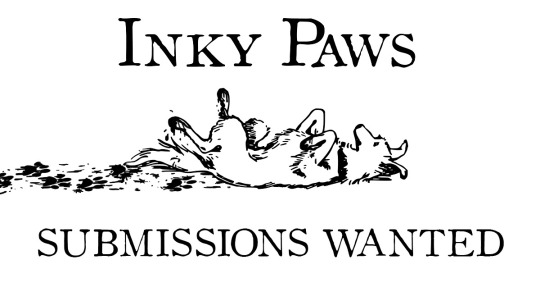
CALL FOR SUBMISSIONS: Inky Paws #3
Inky Paws is a nonhuman anthology zine for original fiction writings by nonhumans and alterhumans about nonhumanity, alterhumanity, and similar, related themes.
This zine is primarily literature focused, but will also be open to more illustrative methods of story-telling such as comics. The zine’s focus is on fictional pieces that are centered around nonhumanity, alterhumanity, therianthropy, and similar (see Submission Guidelines section for more details).
You are welcome to submit:
Short stories
Microfiction
Satire
Poetry
Song lyrics
Experimental fiction (fake newspapers, fake recipes, fake blogs, fake posters, etc.)
Mixed media
Comics
And more! If you're unsure, just ask! Seriously, please just ask. I promise I would 10000% love to hear about your idea even if you're unsure about submitting it, there is no such thing as a bad idea and I cannot stress this enough.
How to participate:
You can submit your pieces in this Google Form!
OR
Email invisibleotherkin(@)gmail(.)com with your submission, and please title the email "Inky Paws Zine #3 Submission". With your submission, please include:
The piece's title or name,
A name or pen name to attribute the piece to,
Any content warnings that you feel are necessary for the piece,
Any social media handle or personal website you’d like to be published alongside your name with the piece (optional), and
Any relevant author notes or author biographical information (optional).
Anonymous pieces are also welcome.
Once submissions have been collected and the deadline has passed, these submissions will be put into the zine and it will be posted online as a free PDF. Submissions are due by April 30th, 2024.
Please see the Submission Guidelines, and Submission FAQ, below cut.
SUBMISSION GUIDELINES:
Each individual may contribute up to 3 accepted submissions to be published in Inky Paws; individuals within systems may each submit 3 pieces, that is to say 3 pieces per systemmate/headmate/preferred term.
Comics and similar multi-part pieces count as one submission altogether: if you submit a single story that has been divided into two sub-stories for dramatic emphasis, or if you submit 10 pages of a single-story comic, or if you submit a written piece of fiction and an accompanying image that you drew or otherwise created to go along with it, that would still only count as one piece.
Submissions must fit the thematic criteria of:
Being explicitly about or based on nonhumans, otherkin, therianthropes, fictionkin, alterhumans, or similar groups, or;
Having strong themes or describing experiences strongly reminiscent of or related to nonhumans, otherkin, therianthropes, fictionkin, alterhumans, or similar such as (but not limited to):
Characters experiencing nonhumanity or alterhumanity as being a part of themselves/their identity,
Characters experiencing anything similar to a shift (including physical shifting),
Characters struggling with (emotionally, socially, or otherwise) being both human and nonhuman or alterhuman in some way,
Characters having a past-life as something nonhuman or alterhuman that strongly still impacts their current life, or
Characters desiring to be nonhuman or have nonhuman attributes.
TL;DR - Your submissions have to relate to or be about alterhumans or nonhumans in some way, shape, or form.
Written submissions must not exceed 7500 words, and must also use a reader-friendly font with a text size of or exceeding 16 pt.
For stories that use multiple different fonts, such as pieces meant to imitate newspapers and similar, every effort will be made to preserve the general "feel" of your piece but fonts may not be transferred over 1:1 due to potential conflicts with font copyright, readability, and overarching zine style.
Multi-part image submissions must not exceed 10 pages in length, and must also use a reader-friendly font with a text size of or exceeding 16 pt if they include text. Images larger than 8.5 x 11in. will be scaled down to an appropriate size; please take that into account when creating and submitting your images. It is also recommended that images be vertical or square in their orientation.
Written submissions should be submitted as a .docx file. Images and mixed media pieces should be submitted as either .jpg or .png files.
All submitted pieces should be your own work. Individuals caught plagiarizing or using AI within their submissions will be barred from participating in Inky Paws, including in any potential future volumes.
SUBMISSION FAQ:
Q: Where will this zine be hosted?
A: The zine will be hosted for free download on Itch.io, where issues 1 and 2 of the zine are already hosted.
Q: What is the cap on submissions?
A: At this time, we are not looking to accept more than roughly 25 submissions at most, in order to keep numbers and expectations manageable.
Q: Can I update my application after submitting?
A: Yes, so long as the updates are submitted before the submission deadline!
Q: What is your policy on content moderation and content warnings?
A: If you feel your piece needs content warnings, please include them in the submission, as we are hoping to include relevant content warnings and maturity ratings alongside all pieces. We are at this time accepting pieces of all tones and ratings.
With that said, It should be noted that any items submitted with soapboxing intent and anti-nonhuman, anti-alterhuman, anti-fictionkin, or similar leans are largely not welcome, as this is a zine geared towards all aforementioned groups and then some.
Q: Can I submit an in-progress draft or sketch? Can I claim a spot in the zine before sending in my submission?
A: We are not currently accepting WIP pieces for submission at this time, though feel free to send us your WIP if you have questions related to its future submission. We also cannot reserve or guarantee a spot in the zine pre-submission, regardless of any existing drafts or WIPs.
Q: Can I submit a piece of fanfiction?
A: While we've now accepted pieces of fanfiction in the past, we tend to prefer to leave them out for legal reasons. If you submit a piece of obvious fanfiction, please know that it may be significantly more likely to be rejected from the zine and that, if the piece is accepted, the piece may be removed without warning from the zine later on if DMCA or legal issues arise. We strongly advise that individuals who wish to write something inspired by fiction make it non-obvious to the outside reader where the inspiration is being taken from.
Q: Can I submit something I've created in the past?
A: You can submit something you've created in the past, but please try to avoid submitting anything that you've published previously and is currently publicly accessible. For example, if the story you want to submit has already been featured in a different anthology, please don't submit it to Inky Paws! We want to encourage people to create new pieces, or to put the spotlight on pieces that haven't previously had the opportunity to be published.
Q: Do I have to write something based on the provided prompts?
A: Nope! The prompts are there by popular request to help give people a jumping off point for creating, but are not required to be incorporated into your piece and will not have any effect on if your submission gets accepted or not.
Q: What is the projected timeline for this project?
A: Submissions will close by April 30th of 2024. The publish date of the zine depends on submission amount and size of submissions; in an ideal world, we hope to have the zine published by December, before year's end.
Q: Can I rescind my submission?
A: As long as you request to rescind your submission before the submission deadline, yes. After the deadline passes and the formatting and work towards publishing begins, we cannot guarantee that we will be able to remove your work from the zine due to time constraints and potential formatting issues. Please take this into account before submitting.
Q: Will there be any physical copies of this zine?
A: Due to cost restraints and a lack of printing experience on the part of the zine organizers, we have no physical copies of this zine planned for print. You are, however, welcome to download and print copies of the zine for personal use.
Q: Who are the organizers of this zine? Where can I reach out to ask further questions?
A: Who-is-Page and Noel Sol of the Sol System are organizing this zine. Feel free to send us any questions, comments, or concerns to invisibleotherkin(@)gmail(.)com, or you can always message us on Tumblr at Who-is-Page.
297 notes
·
View notes
Text
palestinian poets: rasha abdulhadi
rasha abdulhadi is a queer palestinian southerner with long covid who cut their teeth organizing on the southsides of chicago and atlanta. rasha's writing has appeared in speculative city, liminality, strange horizons, shade journal, mizna, room, itap| magazine, beltway poetry, and lambda literary. their work is anthologized in essential voices: a COVID-19 anthology, unfettered hexes, halal if you hear me, stoked words, and luminescent threads: connections to octavia butler. rasha is a member of justice for muslims collective, the radius of arab american writers, and alternate ROOTS. their small book of poetry is WHO IS OWED SPRINGTIME (neon hemlock press). you can find rasha on twitter.
RASHA'S CALL TO ACTION
"rasha abdulhadi is calling on you, dear reader, to join them in refusing and resisting the genocide of the palestinian people. wherever you are, whatever sand you can throw on the gears of genocide, do it now. if it's a handful, throw it. if it's a fingernail full, scrape it out and throw. get in the way however you can. the elimination of the palestinian people is not inevitable. we can refuse with our every breath and action. we must."
IF YOU READ JUST ONE POEM BY RASHA ABDULHADI, MAKE IT THIS ONE
"Casting Runes" was originally published by fiyah literary magazine in the palestine special issue, which was curated, edited, illustrated and comprised entirely of palestinian creators, in december 2021. the collection was edited by guests nadia shammas and summer farah, and featured cover art by leila aboutaleb.
if you have the means, you can purchase the e-book of the fiyah lit palestine special issue for USD $5.99, the proceeds of which go to medical aid for palestinians.
OTHER POEMS ONLINE THAT I LOVE BY RASHA ABDULHADI
Rabbits at lambda literary
Picking up Rocks at split this rock (also read aloud)
Dad's Combs at beltway poetry
Table of Contents for a Manual of Pandemic Response Protocols at poetry.onl (also read aloud)
Safe Harbor in Enemy Homes at get lit anthology
Build the Graves at the deadlands
How to Build a Dad Out of Bricks at electric lit
468 notes
·
View notes
Text
If you're a SFF reader who's wanting to read more Palestinian fiction, check out this #ReadPalestinianSpecFic resource, a big list of books, poetry, short fiction, and comics by Palestinian authors.
a couple I have read previously:
Nayra and the Djinn - MG fantasy graphic novel
Zenith - free short comic, a post-apocalyptic adventure about the phases of the moon, Islamic futures, and asserting your identity
(by the same artist as above, Being is an itch.io game + comic that looks interesting)
Squire - YA fantasy graphic novel about knights and imperialism
Munera and the Moon - free short story about a djinn and a ghost
The Mandrake Loves The Olive - in Xenocultivars anthology, but is also available separately. a queerplatonic tale inspired by Palestinian herbal folklore.
From Whole Cloth - short story about an ace prince & storyteller negotiating a relationship
Which One Is Meat? - a free spooky magical short comic
The Sentient - adult sci-fi about clones, cults, consciousness and coming to terms with the past
(read nonfiction and realistic fiction too, but perhaps this is somewhere to start)
439 notes
·
View notes
Text
Hello beautiful people out here!
I am Deepali. I am from Pune, Maharashtra. I am 21 years old (shaadi ki umar)
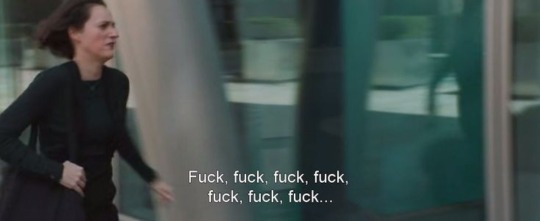
Desi fleabag? Because I relate the most with that specific character. Horny, messy, vulnerable, and crazy all the time but also considerate, expressive, and kind. I am a desi version of her.
🎀What I like? I like to dance, sing, journal, write poems and stories, and doom scroll all the time

📍Professional side of me
I did my bachelor's in philosophy. I have been working in an organization for quite a long time. I am a content writer. I am a writer/poet. I am an open mic performer. I have performed at esteemed platforms like tapeatale, poemsindia, kommune, and many more. I am a psychology and sociology student too. I am a co-facilitator and youth lead in different schools through my organization. I have worked on poetry anthology books.
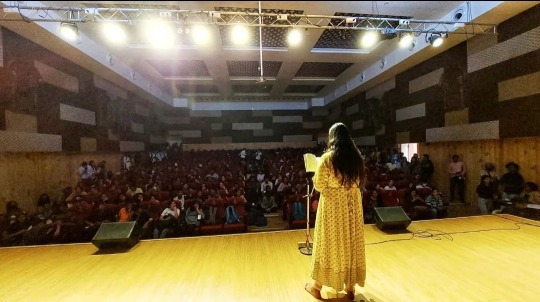
The most important part of my life is being a poet or a writer. It's been a decade since I started writing, and professionally, it's been two years. My poetry and stories revolve around different and unique topics like mental health, family dynamics, feminism, societal norms and culture, romance, life intricacies, friendship, etc. I love being a poet and telling people stories about me and the world because I believe poetry is everywhere. I have a blog called Sip and Sofa Stories where I share the most wholesome blogs and fun-to-read stories.
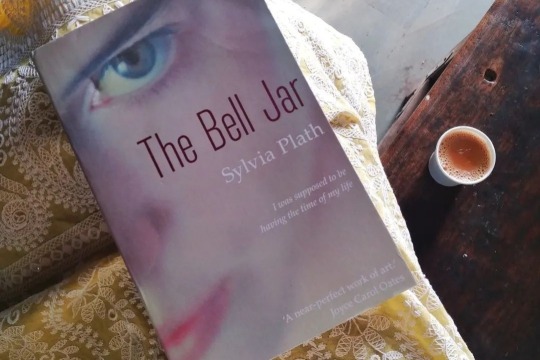
Not much of a reader, but I like reading poetry by Sylvia Plath and more female writers.
💌 Movies and songs? I am a die-hard fan of Bollywood. I listen to 2000s Bollywood and retro songs. No one can challenge me the way I vibe on these songs and dance. My childhood is memorable because of Sunidhi Chauhan, Lata Mangeshkar, Kishore Kumar, RD Burman, Asha Bhosle, Sonu Nigam, Shaan, Arijit Singh, and many more artists. I also listen to Kpop, pop, indie type of music on days when I am dissociating at the fullest. Hold my clutcher, I am a Swiftie and Lana Del Rey fan too, bitch.
I love Bollywood movies, and I am yet to discover more Western movies. I have a bunch of comfort movies like Ye Jawani Hai Dewaani, Piku, Om Shaanti Om, etc.
🪕 My aesthetic type? A combination of Geet and Piku and a little bit of Poo vibe sometimes. But I love desi clothes. Kurti, jhumkas, bindi, bangles, oh god I love being a woman.
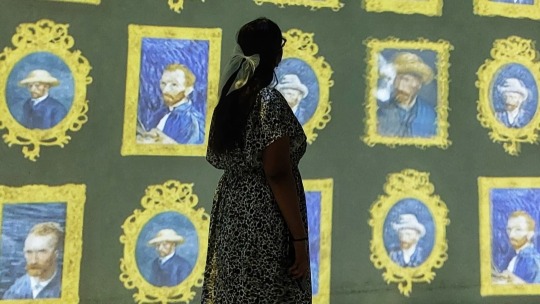
Interesting facts about me :
🌸I have three tattoos on my body (Crescent moon, "you're on your own kid" title, "grateful"). I love getting tattoos!!
🥃Loneliness who? I go to bars, cafes, and parks alone because why not. I fear no god.
💛I never was in a relationship, just some hardcore crushes who crushed my soul.
❤️🩹I have been in therapy for almost three years and on and off on meds. GAD (generalized anxiety disorder) gang assemble!
😶🌫️I love and hate spending time on LinkedIn. Girl boss era.
💬I write poetry about my crushes and defame my ex-friends. They know it very well! Lol.

I am a hopeless romantic and a professional delusional person. I will cook the best scenarios in my head and write about them. I romanticize life on another level though there are 156 rupees in my bank account by going to aesthetic cafes.
:¨ ·.· ¨:
`· . ୨୧⭒๋࣭ ⭑ 𝛢𝑛𝑑 𝑤ℎ𝘰'𝑠 𝑔𝘰𝑛𝑛𝑎 𝑘𝑖𝑠𝑠 𝘵ℎ𝑒 𝑏𝑟𝘰𝑤𝑛 ℎ𝑎𝑖𝑟𝑒𝑑 𝑔𝑖𝑟𝑙𝑠,𝑊ℎ𝘰'𝑠 𝑔𝘰𝑛𝑛𝑎 𝑤𝑖𝑝𝑒 𝑎𝑤𝑎𝑦 𝘵ℎ𝑒𝑖𝑟 𝘵𝑒𝑎𝑟𝑠? ⊹ ‧₊˚
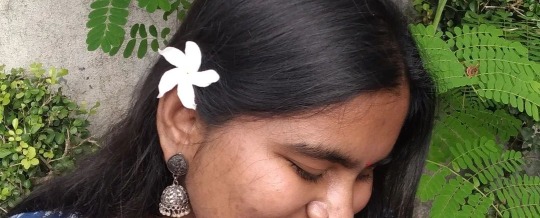
🖇To connect with me
𖹭 kavitavali.deepali to read my poems and stories on instagram
𖹭 sip and sofa stories blog. I write monthly blogs

Thankyou for reading my long ass introduction! Flying kiss tumhai💋
#a much awaited intro mera!#bohot mehnat lagi bc#hellowww!#desi dark academia#desiblr#desi#desi shit posting#desi academia#light academia#dear diary#poems#poetries#short essay#spilled poetry
78 notes
·
View notes
Text
Tamamizu Monogatari, a unique love story
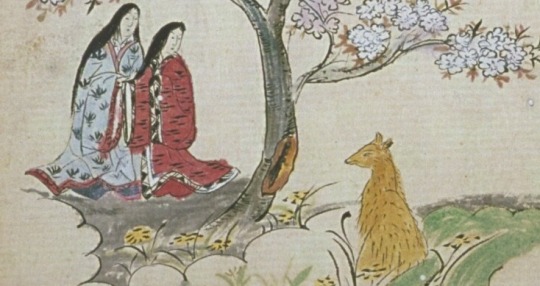
This article, unlike most of my recent longer pieces, was not planned in advance. I learned about the subject very recently, and instantly realized I absolutely have to introduce it to more people, the previously posted schedule be damned.
The Tale of Tamamizu (玉水物語, Tamamizu Monogatari) is a story about a fox turning into a human, but a rather unconventional one, filled with an unusual degree of sympathy for the eponymous protagonist and focused on a rather unique relationship. In addition to summarizing it in detail and explaining the possible inspirations behind it, I will also try to explain why the tale found a new life on social media as a, broadly speaking, lgbt narrative, and why I think there is a compelling case to be made for such an interpretation.
Unless stated otherwise, all images used through the article are taken from the Kyoto University Rare Materials Digital Archive, on whose website you can view scans of the original Tamamizu Monogatari.
The Tale of Tamamizu, also known as The Contest of Autumn Leaves (Momiji Awase) is an example of otogi-zōshi, illustrated prose narrative. The story was presumably originally composed in the Muromachi period (1335-1573), and it survives in multiple copies dated either to the early Edo period or to the end of the Japanese “middle ages” directly preceding it. The identity of the author (or authors) is unknown.
Despite its apparent popularity in the past, it seems no major studies of the tale of Tamamizu have ever been conducted. A streamlined translation (or rather an extensive summary) was published online by Kyoto University Library in 2001 and can be accessed here. In 2018, a full translation, as well as a brief introduction, were prepared for the anthology Monsters, Animals, and Other Worlds. A Collection of Short Medieval Japanese Tales. Still, it doesn't seem either sparked all that much interest in Tamamizu, despite the story’s obvious modern appeal.
Since the tale of Tamamizu is not well known, I will start with a detailed summary. I am consistently using female pronouns for Tamamizu after she transforms, as does the older translation. The other English translation switches between female and male pronouns. I will explain in the final paragraph of the article why I made the decision to follow the former.
The Tale of Tamamizu
The story of Tamamizu does not start with the eponymous character, but rather with a certain mr. Takayanagi from Toba. He is troubled, as while he is already 30, he has no children. He decides the only choice is to pray to gods and buddhas. This actually does work, and his wife becomes pregnant, and after the expected period gives birth to a daughter. She doesn’t get a name at any point in the story.
The girl’s birth is followed by a timeskip. As we learn, she was distinguished by twenty five features associated with beauty. This is apparently a reference to the belief that a buddha possessed thirty two specific physical traits; the number might have been altered to twenty five because of a popular group of twenty five bodhisattvas associated with Amida. By the time she reached the age of fifteen or so, she also developed great skill in composing poetry in both Japanese and Chinese. Her parents at some point decided that it would be ideal to send her to serve in the emperor’s court in the future.
The girl spends most of the time in awe of the blooming of flowers, the wind and other similar phenomena, as one would expect from a literary character of similar status. She maintains her own flower garden, and spends much of her time there.

On one of the days when she visited it alongside her friend Tsukisae, the daughter of her nurse, she caught the attention of a fox. The fox is, at this point in time, not yet Tamamizu. He wishes he could introduce himself to the girl. He considers the standard method - transforming into a nobleman - but he realizes this would likely sadden the girl’s parents, and would tarnish her reputation. He falls into despair. It does not exactly help that his attempts at visiting the garden again end up poorly - on the way there, he gets pelted with stones and then, after trying again, shot with an arrow. Still, he continued to hope to meet with the girl.
An opportunity finally arose through a lucky coincidence. Another family living in the same area had multiple sons, but no daughters, much to the parents chagrin. They loudly lamented that they wished they had at least one girl among the children. The fox overheard that and realized it might be an opportunity. He transformed himself into a teenage girl (curiously, the story specifically puts her at the exact same age as the unnamed second protagonist), and enters their house. She explains that she is an orphan, and while passing by she overheard the family’s woes. She offers to become their daughter. The couple instantly agrees.

The fox spends some time living with her adoptive family, though she gets sad easily and keeps bursting into tears. After some time, they offer that they will find her a husband in due time, but she reacts to that poorly, and eventually suggests she would prefer to become the servant of a noble lady. Her adoptive mother agrees this isn’t a bad idea, and reveals that her younger sister is a lady-in-waiting of the daughter of a local noble, mr. Takayanagi. She suggests the fox could become her attendant too. She is overjoyed at this prospect, and is soon sent to Takayanagi’s mansion to meet with his daughter.
The girl receives her new attendant warmly, and gives her a nickname, Tamamizu-no-mae (Tamamizu for short). They get along really well, and Tamamizu gets to partake in her various activities, serves her food and drinks, and even sleeps in the same bed (Tsukisae does too, though).
While Tamamizu does remarkably well as a human, some of her fox habits remain. Most notably, she is really afraid of dogs. Her lady sympathizes with her plight, and actually bans dogs from her household. This is a much welcome change from Tamamizu’s point of view, though apparently some other members of the staff start to view her as a coward because of this, and simultaneously resent her closeness with the girl.
The bond between Tamamizu and the girl reaches a new level when on a moonlight night they spontaneously compose a poem together. It deals with longing. We are told it was followed up by multiple other poems, which are not quoted in the story. Eventually the girl gets tired and heads to her room. However, Tamamizu remains outside gazing at the moon and eventually starts crying, unsure what fate awaits her. Tsukisae, who was inside all along, actually becomes concerned about Tamamizu, and says she feels sorry for her, correctly identifying the cause of her sorrow as love for an unidentified party. She shares her thoughts with their lady (in the form of a poem, of course). The latter summons Tamamizu inside, and soon all three go to bed together. Tamamizu is still overwhelmed by her feelings and can’t fall asleep, though.
Tamamizu continues to serve the girl for the next three years. She also remains in touch with her adoptive mother, who sends her letters and new clothes every now and then.
One day, many visitors arrived in the house for a friendly competition. The winner will be the person with the most beautiful collection of autumn leaves. Tamamizu decides she must find some for her mistress to give her an advantage. To accomplish that, at night for the first time in years she turns back into a fox, and leaves to visit her siblings. Not the adoptive ones, though.
As it turns out, she has two fox brothers, one younger and one older. She actually hasn’t visited them in so long they assumed she died and held funerary services for her in the meanwhile. They are overjoyed to learn that is not the case, and after learning about her current life agree to help her with finding unique leaves. She tells them to leave them on the veranda of her mistress’ mansion, and reassures them it’s safe for foxes to be there thanks to the earlier decision to not allow dogs on the premises.
After the visit Tamamizu returns home in her human form. Tsukisae and her mistress ask her where she has been, and she jokes about meeting with a “dubious fellow” (which, to be fair, is not even a lie, given the typical folkloric portrayal of foxes). This in turn leads to more jokes, revolving around Tamamizu no longer thinking about her mistress. She feels distressed by this suggestion.
Tamamizu’s brothers in the meanwhile succeed in their search for thrilling leaves. One of them found a branch with five-colored leaves decorated with the Lotus Sutra (as you probably know, one of the main religious texts in the Mahayana Buddhist tradition). Tamamizu is overjoyed, and instantly brings them to her mistress.
The girl received plenty of leaves from other people in the meanwhile, but all of them pale in comparison. She is so happy about the gift that she requests Tamamizu to also write poems meant to accompany the presentation of the collection. She protests that she is unsuitable, but eventually accepts this honor and gets down to work. The parents of the girl came along to watch her write, and both of them concluded she is exceptionally skilled. She ends up providing five poems, one for each color of leaves gathered. They are subsequently combined by these the girl wrote herself.
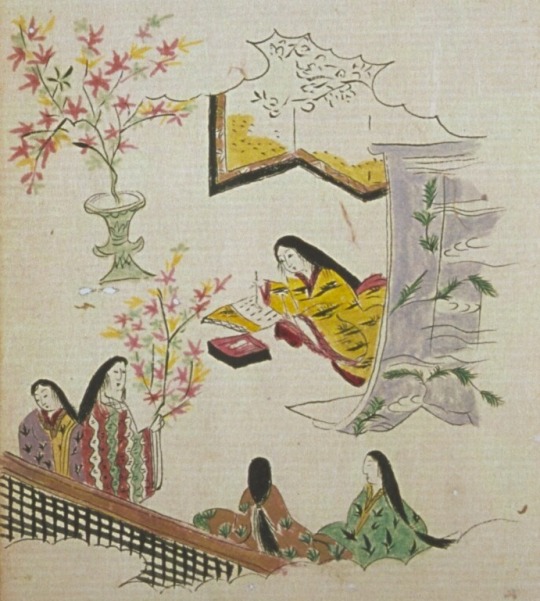
Obviously, the main characters’ joint entry wins the competition. This grants the girl such fame that the emperor declares she should come to his court. Since her father is not affluent enough to pay for traveling there, he bestows additional estates upon him to make that possible. Even Tamamizu gets her own estate, Kakuta in Settsu Province. However, she decides it will be for the best to give it to her adoptive parents.
Shortly after that, Tamamizu’s adoptive mother falls sick. She leaves her mistress to attend to her, but it did not help much and her condition kept worsening. Therefore, her stay had to be extended over and over again. This predicament worries her mistress, who sends her a letter to let her know that it is boring and gloomy without her around, and implores her to return as soon as her mother’s condition improves. Tsukisae is similarly concerned. Both of them voice their concerns through poems, which at this point should not be surprising for the reader.
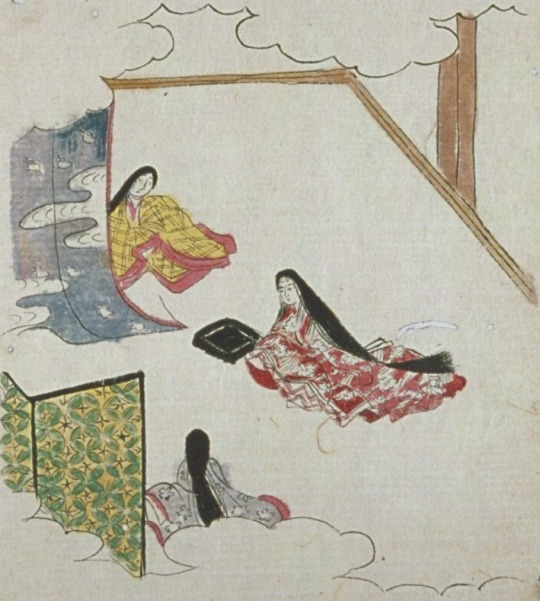
Tamamizu of course appreciates these displays of sympathy, but she cannot return, so in response she only reassures both of them that she will meet with them again as soon as possible.
Shortly after that, the mother’s condition worsened yet again. The entire family laments through the entire day, but eventually everyone manages to fall asleep - save for Tamamizu.
In the middle of the night Tamamizu notices that an old, hairless fox entered the house. She quickly realizes that he was her paternal uncle (a fox uncle, that is. Not a relative of her adoptive parents). The illness was his doing, as she quickly realizes. Tamamizu requests him to leave her adoptive mother alone. However, the old fox says he cannot do that, as the illness is his act of revenge against her family, since her father killed his child. He concluded it is only right to make his daughter sick so that she dies too.
Tamamizu admits that this makes sense in theory, but she points out that acting upon desire for revenge will only bring bad karma, and bad karma from previous lives is why both of them were born as foxes in the first place. She offers the old fox a crash course in Buddhist ethics, and warns him that accumulating even more bad karma might lead to someone eventually killing him too, and to yet more rebirths in one of the three realms which are best to avoid (animals, hungry spirits, hell).
The old fox notes following buddhas is for humans, not for those born in other realms of rebirth (he’s not entirely wrong, humans are generally held to be in the optimal condition to seek enlightenment; animals must follow instinct and thus end up accumulating bad karma, devas are to preoccupied with celestial bliss), but eventually he relents and agrees that it would be wrong to kill the woman because of the actions of her father. He concludes that it would not even make him feel better, since his child would remain dead. He tells Tamamizu that evidently he was able to meet her because of good karma acquired in a past life, asks her to pray for his deceased child, and leaves, announcing he shall become a monk reciting nenbutsu from now on.
Tamamizu did what he asked for, and even performed a funerary service for her late cousin. With the problem solved, her adoptive mother returned to good health. She was therefore free to meet with her mistress again. She was elevated to the rank of chujo no kimi, the foremost among servants.
However, despite her mistress’ best efforts to make her feel appreciated, she was suffering from persistent bouts of melancholy. She wished she could confess her love and consummate the relationship, but she concluded that since she kept her identity secret for so long, it would be no longer possible to reveal it without losing the acceptance of the girl. She decides she must disappear. However, before that she prepares a long poem explaining her predicament.

She placed it in a box, and gave it to her mistress, explaining that it should only be opened if something happens to her. She then broke down in tears.
Tamamizu’s mistress does not fully understand what is happening, and asks if she perhaps is worried about their planned relocation to the imperial court. However, Tamamizu denies that and guarantees she will accompany her on the journey there. Her mistress starts crying too, and says she has hoped they will always be together.
Shortly after, the day of the journey came. Tamamizu’s mistress and mr. Takayanagi, now recognized as a lord, were certain that she went with them, but as soon as they reached their destination it turned out she was nowhere to be found. Days upon days of grieving followed.
Eventually, the girl realized that she had no choice but to open the box. From the poem contained within, she learned everything about Tamamizu, from the day they first met all the way up to the disappearance. It explained how she hoped to protect her mistress through her current life and beyond, but had to give up after realizing it was all in vain. In the final words of the poem, she firmly refers to her with the name she was given by the girl - Tamamizu.
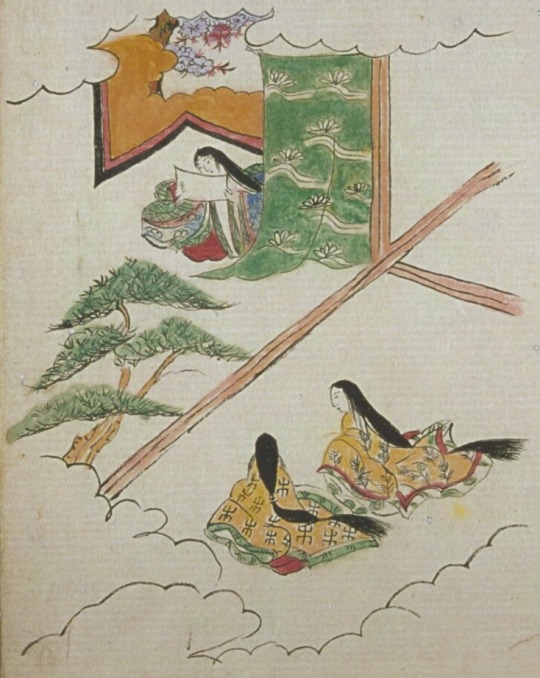
The poem moves her deeply, but the story does not have a happy ending - we never learn what happened to Tamamizu afterwards.
Tamamizu’s forerunners
It is agreed that much like the considerably more famous Tamamo no Mae, Tamamizu in part depends on earlier Chinese literature about foxes. Not exactly on the same sort of stories, though - she is not exactly a malevolent seductress, to put it lightly. The key to finding her forerunners is the scene in the beginning when the still nameless fox considers transforming into a male suitor at first, before settling on the form of a female attendant, and the erudition she displays through the story. An argument can be made that this is conscious engagement with a very specific type of older fox story, largely forgotten today.
In Tang China, fox stories enjoyed considerable popularity. You may remember that I mentioned this in passing a few months ago in another fox-themed article. One of the genres popular at the time was focused on fox suitors. There are many stories like that, but they largely follow a similar plot: a male fox falls in love with a human girl, takes the form of a dashing literatus and requests marriage. The girl’s family rejects the proposal, as despite charm and erudition the fox is ultimately an outsider with no family, and doesn’t depend on the well established institution of matchmaking. Afterwards, he typically tries to win the girl over with some sort of trick, and fails in the process, thus meeting his demise when his real identity is inevitably exposed.
In some cases, twists are introduced and the fox is effectively exploited by the family: for example, in the story about a certain mr. Hu (a common surname which is a homonym for the word for fox) and the granddaughter of the official Li Yuangong, the Li family agrees for the girl to be taught by the fox, and even asks him for advice on various matters, just to kill him once he outlived his usefulness.

Zhou Wenju's painting A Literary Garden (文苑图, Wenyuantu), showing a group of discouring Tang literati (wikimedia commons)
Many literati came from humble backgrounds, and only attained high positions thanks to success in the imperial examinations. However, their advances were often frowned upon by nobles, who saw them as upstarts. Therefore, faking a more notable origin was widespread to secure a better position in the high strata of society. All of this is reflected in the stories of the fox suitors. Xiaofei Kang, who wrote my favorite monograph about Chinese fox beliefs, notes that the stories might have effectively been a way to cope with everyday anxieties. In other words, perhaps the fox self insert fails so that the real person sharing his precarious status can succeed.
Another aspect of the Tale of Tamamizu which offers a clue about its origins is the focus on Buddhism, and its role in the lives of non-humans in particular. Tamamizu evidently attains a considerable familiarity with Buddhist doctrine, to the point the old fox basically seems to perceive her as thinking more like a human than a fox. Evidently, she doesn’t think being an animal should prevent one from seeking good karma. This seems to reflect a medieval Buddhist phenomenon.
Roughly from the Insei period (1086-1185) up to the eighteenth century, and especially between the twelfth and fourteenth centuries, the dominant esoteric schools of Buddhism propagated the doctrine of hongaku (本覺), “original enlightenment”. This idea originates in an earlier Buddhis text, Awakening of Faith in the Mahāyāna. According to proponents of this idea all living beings, even plants, possessed an innate “Buddha nature”, as did natural features like mountains. They were innately capable of attaining enlightenment, or innately enlightened outright. Religion influences art, so it has been argued that the spread of new stories about animals behaving like people in the Muromachi period had a distinctly Buddhist dimension.
The modern reception of Tamamizu
Despite the fascinating themes of the story of Tamamizu, it only found a greater degree of modern recognition in 2019, outside of academic circles at that. I'm surprised it took so long, since when you think about it, the sensibilities of the author indeed seem surprisingly modern. The narrator even reassures us Tamamizu’s human form is the same age as the object of her affection, anticipating what sorts of shipping discourse could arise 700 years later.
Anyway, in 2019 a fragment of the story was the subject of one of the classical Japanese literature questions from the National Center Test for University Admissions, a standardized university entrance exam held across Japan each January from 1990 to 2020. This obviously exposed an enormous number of people to it, not just exam-takers.
Following this event, a Tamamizu fad seemingly swept social media and pixiv (curiously, there’s a single piece of art there which predates the phenomenon by six years; op actually updated the description in 2019 to say they are happy more people learned about the story). There’s even a Tamamizu Monogatari tag on Dynasty Scans as a result. It’s worth pointing out the wikipedia entry of the story was written in 2019 as well. Most curiously apparently a research project focused on Tamamizu, Kahoko Iguru’s Border transgression between species and gender as observed in “Tamamizu Monogatari”, received a grant in the same year too (source; more info here). It doesn’t seem the results have been published yet. I will keep you updated if that changes, obviously. I am actually surprised I didn’t notice the Tamamizu phenomenon back then, even though 2019 Antonia was distinctly more terminally online than 2023 Antonia is.
It’s worth noting that Tamamizu’s fame didn’t fade away. The online following the story gained was referenced in an Asahi Shimbun article a year later. A quick survey of social media will show you there are people still talking about Tamamizu today. People who aren’t me, that is.
What made Tamamizu so unexpectedly popular - arguably more than the story has been in the past few centuries - in recent years? Most of the linked sources relatively neutrally state that people perceive it as a “unique love story”. Social media posts are often considerably more direct: for many people, the appeal lies in the realization the Tale of Tamamizu is probably the closest to a lesbian love story in the entire corpus of medieval Japanese literature. I won’t deny this is in no small part its appeal for me too. Note this is not an universal sentiment by any means, though.
It is difficult to tell if this was the intent of the medieval author(s), of course. It is obviously impossible to deny that women attracted to women existed in medieval Japan, as is the case in every society since the dawn of history. However, they left little, if any, trace in textual sources. As pointed out by Bernard Faure, in Japan in the past as in many other historical societies “sexuality without men is properly unthinkable” and therefore received no coverage.
While there is plenty of Japanese Buddhist literature dealing with male homosexuality (trust me though, you do not want to read it; I’ve included a brief explanation why in the bibliography), there is basically nothing when it comes to women. The only possible exception is what some authors argue might be a medieval depiction of a lesbian couple in Tengu Zōshi, a work I plan to discuss in more detail next month, but note that this would be only an example of condemnation, since this work is a religious polemic dealing with vices of the clergy.

The supposed lesbian couple from Tengu Zōshi; image from Haruko Wakayabashi's The Seven Tengu Scrolls: Evil and the Rhetoric of Legitimacy in Medieval Japanese Buddhism; reproduced here for educational purposes only.
This sort of absence of evidence is a recurring pattern through history - you might recall my own attempts to find out what Bronze Age Mesopotamian sources have to say on this matter. Before the Meiji period, when the term dōseiai (同性愛) was coined as a calque of Charles Gilbert Chaddok’s freshly invented label “homosexual”, there wasn’t even a distinct Japanese term which could be applied to lesbian relationships. Once again, this does not indicate this phenomenon did not exist - but it does indicate that due to extreme levels of sexism in the perception of both sexuality and relationships it was difficult to even imagine for the average author. Faure suggests the prevailing attitude was presumably similar as in continental Buddhism, in which lesbian love “was at best perceived as a poor imitation of heterosexual relations—or a preparation for them—and as such condemned” at least in monastic rules. To put it bluntly, only penetrative sex was regarded as real.
And yet, in spite of this, I do not think it is wrong to wonder if perhaps what seems like subtext to a modern reader is actually intentional. This is obviously a reach, but given that relationships between women - not even romantic ones - were historically not a major concern of most authors, I would argue it is not impossible that a work which revolves virtually entirely around the relationships between female characters was written by a woman. Perhaps a woman romantically interested in other women, even.
Even more boldly, I’d ponder if perhaps the ambiguous gender of the fox before transformation was meant to make the romance palatable to general audiences. Note that while foxes transforming is a mainstay of both Japanese and Chinese literature, the change of gender is actually quite uncommon in such stories, making this single reference all the more unusual. Granted, gender change is hardly a major focus in the story of Tamamizu. The only real indication the fox is male is the decision to take a male human form at first, but beyond that, things get muddy to the point the matter of gender in the story evidently warranted an actual study, as I pointed out earlier. As you’ve noticed, this matter was approached in different ways by translators too.
I personally think the most important factor is the fact Tamamizu refers to herself with this name in the final poem. This name is intimately tied to the distinctly female identity she took. Whoever she was in the beginning, by the end of the story she is clearly Tamamizu. If one felt particularly bold a case perhaps even be made that Tamamizu can be read as a trans woman based on this, perhaps. I think simply disregarding the brief reference to a male form is valid too, though.
Even if these arguments were to be refuted fully, I would argue that there is a further reason why at the very least reinterpreting the story as dealing with a gay relationship is not against the spirit of the original work. As I outlined, the tale of Tamamizu seems to draw inspiration from a very specific genre of fox stories, in which foxes are essentially a metaphor for people seeking relationships which were frowned upon. Obviously, the fact that Tamamizu is not a human by default makes any relationship she would be involved in somewhat unusual and frowned upon, but that does not assign a different metaphorical meaning to her struggle.
Is Tamamizu even really fully a fox and not a human at all by the time she writes the confession of her love, though? The old fox seems to basically dispute if she still thinks like an animal. We also know that she maintained her human form for so long her biological relatives assumed she had passed away. She also found acceptance of virtually every single human character in the story - save for herself, that is. It’s also not like it’s hard to reinterpret her struggle specifically with the inability to consummate the relationship through the lens of the medieval Buddhist views of female sexuality, rather than through the lens of the general view that relationships between human and transformed foxes were doomed to failure.
To paraphrase Cynthia Eller’s evergreen quote about futile search for nonexistent matriarchal prehistory in ancient texts, I do not think an invented wlw past can give anyone a future, but at the same time I do not think it means we should conclude that nobody ever had similar experiences in the past, or that we can relate with works even in ways their authors did not intend. For this reason, I would ultimately argue in favor of embracing the Tale of Tamamizu as a narrative which can be read as a lesbian love story.
Bibliography
Bernard Faure, The Red Thread. Buddhist Approaches to Sexuality (please note: read this book very cautiously since multiple content warnings apply. Faure is a remarkably progressive author, so it’s not about his personal attitude or anything. The problem is that it is not possible to deny much of the Japanese Buddhist discourse about homosexuality had little to do with modern notion of gay relationships, and essentially amounts to explaining when exploitation of children is a pious act)
Rania Huntington, Alien Kind. Foxes and Late Imperial Chinese Narrative (some sort of explicit content warning applies here too, though mostly because some of the discussed works are trashy Qing period erotica. More funny than anything.)
Xiaofei Kang, The Cult of the Fox: Power, Gender, and Popular Religion in Late Imperial and Modern China
Keller Kimbrough and Haruo Shirane (eds.), Monsters, Animals, and Other Worlds. A Collection of Short Medieval Japanese Tales
Jacqueline Stone, Medieval Tendai hongaku thought and the new Kamakura Buddhism: A reconsideration
193 notes
·
View notes
Text
My personal top albums of all time
If anyone who respects my music opinions is interested, IN NO ORDER because I can't choose between my babies. Also, warning, it's mostly gonna be albums from the 90s. Only the albums that are described as Gothic Rock, Darkwave (Neoclassical or not), Deathrock and Ethereal Wave are goth, the rest are some other flavor of dark alternative.
Aégis, by Theatre of Tragedy (1998)
Exquisite Gothic Rock, despite the band usually playing Metal, with themes of mostly Greco-Roman mythology with some other European folklore thrown in. The most angelic and soft soprano vocals delivered by Liv Kristine with baritone whispers delivered by Raymond. Ethereal yet complex atmospheres with soft guitars, strong bass, poetic lyrics in Shakespearean English.
Highlights: Cassandra, Venus, Poppæa, Bacchante.
Inferno, by Lacrimosa (1995)
Gothic Rock that flirts slightly with Metal in some tracks. This is when they made the jump from Neue Deutsche Todeskunst (basically late 80s/early 90s German Darkwave except it's a little weirder than most other Darkwave at the time) to more Rock-based styles of music, as well as the first album Anne Nurmi was featured in. Tilo's best studio vocal performance in my opinion. Beautiful lyrics about love, passion, devotion, and the end of the world, could only be written by a goth guy with a gift for poetry who just fell in deep love. Only iffy track is Copycat but even that one is still a classic among fans if only because of its high energy, and killer guitars, bass and percussion.
Highlights: Schakal, Vermächtnis der Sonne, No blind eyes can see, Kabinett der Sinne.
Passion's Price, by Diva Destruction (1999)
Diva Destruction's debut, from back when Darkwave was actually dark and dreary in sound. Songs about heartbreak, betrayal, abuse and love, in the band's most musically complex and hauntingly atmospheric album. A definite classic with nothing but great track after great track.
Highlights: The Broken Ones, Snake, Prey, Glare.
Selected Scenes from the End of the World, by London After Midnight (1992)
Some of the best Gothic Rock to have ever come out, in my opinion. Deep, rich, dark, mysterious, sensual, macabre, romantic (arguably too romantic even by 90s goth standards as the album apparently got criticized for being almost entirely love songs? Wtf). The song that introduced me to goth in February of 2007 is in this album and it's the reason why I never looked back.
Highlights: The Black Cat, Claire's Horrors, Sacrifice, Spider and the Fly.
Annwyn, beneath the Waves, by Faith and the Muse (1996)
Ethereal Wave royalty in maybe not their most iconic album, but definitely the one closest to my heart by them. Despite goth music being associated with darkness in the minds of most, this album is full of glittering light in the most poetic and heartfelt way possible. The vocals are soft and tender when they need to be, delivered by Monica Richards, or firm and epic when needed, as delivered by William Faith. The lyrical themes are full of Celtic folklore, love, hope, magic and a feeling of reclamation of nature and an ancestral past (but not in like, a white supremacist way, I promise).
Highlights: Annwyn, beneath the Waves, The Hand of Man, The Silver Circle, Rise and Forget.
Treasure, by Cocteau Twins (1984)
Walking a thin line between Ethereal Wave and Dreampop (as they're pioneers in both genres). Some tracks are darker than others, but they're all equally delightful, full of beauty and a dreamy gaze hovers over every single song, all of which contain some of the most heavenly vocals in the scene. One of Robert Smith's favorite albums (he also really like Diva Destruction's debut!). If you're into more relaxing and atmospheric music, this might be your intro to goth.
Highlights: Beatrix, Persephone, Pandora (for Cindy), Lorelei.
Anthology, by Nosferatu (2006)
Legendary Gothic Rock band among those of us who enjoy a campier vampiric goth sound that takes itself too seriously, and deliciously so. Yes, I know I'm cheating by going with a compilation album, sue me. It's simply a collection of their best tracks and I honestly couldn't choose between all their actual albums, so there!
Highlights: Inside the Devil, Lucy is Red, Rise, Witching Hour.
Es reiten die Toten so schnell (or: The Vampyre Sucking at his Own Vein), by Sopor Aeternus & The Ensemble of Shadows (2003)
Probably the gothiest and most elite Neoclassical Darkwave out there. Deeply macabre, equally horrific and beautifully crafted, with expressive and dramatic vocals, themes of vampirism and death masking more human subjects such as social rejection (Anna Varney-Cantondea is a trans woman/transfeminine person who's battled suicidality and depression from a very young age), depression, gay/trans desire, and suicidality. It truly is a masterpiece of macabre and neoclassical goth.
Highlights: The Feast of Blood, Holy Water Moonlight, Baptisma, Dead Souls.
Blood Death Ivory, by Angelspit (2008)
Probably one of the few modern Industrial bands who have thoroughly kept the spirit of early Industrial alive, fashioned after greats such as Skinny Puppy and Die Form, especially in the 00s when the Industrial scene heavily turned to more superficial lyrics based on the aesthetics of cyberpunk art rather than its subversive content. The music is aggressive, simultaneously animalistic yet robotic with a touch of demonic, rarely ever without smartly phrased critiques of capitalism and consummerism. At this point in time the band was a duo between Amelia Arsenic/Destroyx and Zoog Von Rock. It's definitely some edgelord shit (affectionate), but by no means in a vapid, only-for-shock-value way.
Highlights: Skinny Little Bitch, Lust Worthy, Devilicious, Jugular.
Alles für dich, by Grausame Töchter (2012)
Some of the most dynamic, deliciously quirky, sexual, hyper and twisted Dark Electro bands currently making music. The lead vocalist and lyricist of the band, Aranea Peel, is a lesbian dominatrix, fetish model, trained ballet dancer, and lover of Weimar republic era artistry who absolutely imprints lots of dark flapper energy into the band's music and imagery. The lyrics are unabashedly perverted, kinky, sapphic and fucked up. Her singing is nothing short of chef's kiss worthy, always expressive and strange, but with pristine execution and technique.
Highlights: Tanz für dich, TABU, Therapie für dich, ICH DARF DAS!
The Astonishing Eyes of Evening, by Cinema Strange (2002)
KINGS of 00s Deathrock with touches of Dark Cabaret influences, as inescapable in the goth scene in the 00s as She Past Away and its many copycats are now, and for very good reason. Delightfully macabre, not the first to use ghostly androgynous vocals but certainly one of the bands who better utilize that style of vocals. Imo, this and their homonymous album are must-listens for people interested in the goth music scene in general, but especially those interested in Deathrock. Truly Halloween turned into an album.
Highlights: Tomb Lilies, Catacomb Kittens, 'Ere the Flowers Unfold, Legs and Tarpaulin.
Opheliac, by Emilie Autumn (2006)
Literally music for mentally unstable sapphic girls with a poet's soul and flare for both irony and intense earnest feeling. It's a very original combination of Synthpop, Punk Cabaret, and Neoclassical music, with influences of Industrial and Darkwave. It's all masterfully crafted by classically trained violinist, poet, writer, actress, and somewhat of a burlesque performer with a rich alto voice; Emilie Autumn. She wrote this album after suffering medical abuse at a mental hospital after a suicide attempt brought on by an abortion and emotionally abusive relationship. I'm not exaggerating when I say this album saved my life and also changed me as a person.
Highlights: Opheliac, Liar, The Art of Suicide, 306.
Of the Want Infinite, by Requiem in White (1995)
You don't often hear of bands combining Deathrock and Ethereal Wave as they're often perceived as the polar opposite ends of the spectrum of goth music; Deathrock being the goth subgenre closest in sound and idiosyncrasy to punk, and Ethereal Wave being one of the goth subgenres furthest from goth's punk roots. Add in an operatic soprano and you get... Some of THE best, most underrated goth bands of the 90s. Dramatic, ethereal, creepy, elegant, ghostly and complex, with incredible vocals. Truly a pity they only released one album and a couple of EPs.
Highlights: Everlasting Peace, Beneath the Leaves, My Shame, Acanthus.
Agony of the Undead Vampire Part II, by Two Witches (1992)
Truly another giant of vampiric Gothic Rock, absolute 90s legends and Finland's most iconic goth band. Themes of vampirism, occasionally anti-Christianity, sex, sensuality and kink abound. The vocals might put some people off, but it's definitely worth it.
Highlights: The Hungry Eyes, The Omen, Mircalla, We All Fall Down.
Mors Syphilitica, by Mors Syphilitica (1996)
Requiem in White may have disbanded after their first proper album, but two out of its three core band members, then spouses Lisa and Doc Hammer, went on to form pure Ethereal Wave act Mors Syphilitica right after and while it's generally less dark and spooky than its predecesor band, they're still a delight to the ears.
Highlights: The Woman Who Believed, Fell a Dance, The Vain Stroke, Below the Baleful Star.
Beyond the Veil, by Tristania (1999)
I've raved about this album so many times. Just... THE definitive Gothic Metal album to me. The lyrics, the choir of sopranos (aka all Vibeke Stene and her rich, sensual, dark, gorgeous voice), the perfect growling, the somber baritone vocals, the perfectly crafted guitar riffs (no guitar salad, all expressive and precisely timed), the exciting epic percussion, the piano, the violin solos, THE SYMPHONICS. Oh, my God. There's not one second wasted in the entire album, and I'm not being hyperbolic, I mean that. Truly the perfect Gothic Metal album.
Highlights: Beyond the Veil, Angina, Heretique, Opus Relinque.
Serpentine Gallery, by Switchblade Symphony (1995)
Tbh all of Switchblade Symphony's discography is fantastic, but their debut truly is a masterpiece. Creepy ragdoll vibes all over, great vocals, rich composition, poetic yet accessible lyrics. If you're into a more kindergoth vibe (Wednesday Addams, creepy dolls, child-like or even lolita-esque looks), this might be the band for you.
Highlights: Clown, Mine Eyes, Dollhouse, Bad Trash.
Vampyre Erotica, by Inkubus Sukkubus (1997)
The other band that introduced me to goth in 2007 and got me to never look back. Though the first song by them I ever listened to, Samhain, isn't from this album, this album is the one that truly got me hooked for life. Vampiric, sensual, decadent and dark. It has everything including really sweet vocals.
Highlights: Vampyre Erotica, Danse Vampyr, Hell-Fire, Heart of Lilith.
Link to a YouTube Playlist containing all the songs from all the albums above.
73 notes
·
View notes
Note
EEEE BACK AGAIN CUZ YOUR WRITING IS YUMMYYY
Valeria, Graves, König, and Soap (separately) who has a s/o who's into poetry?
like maybe they're a poet or a librarian or something.
bonus points for a silly little cozy aesthetic dressed s/o :33
MANY HUGSSSS
-☁️
(CLOUD ANON)
Hello again! Welcome back! I'm glad my silly writings are enjoyable to people! I wrote it so Reader is a librarian and writes poetry both, in most of these! I think I forgot for Soap! I hope these are good enough! Thank you very much for the request! ^^
Soap, Valeria, Graves, König with an S/O who likes Poetry
Soap: While he may have read some poetry throughout his life, but only because he was forced to at school, he doesn’t care for literature like that in the slightest. Sure, he can understand some metaphors and some messages a piece of writing might try to convey, but he won’t go out of his way to buy himself an anthology of William Blake. He doesn’t have the time to read, and he doesn’t really want to either, he’d much rather go outside and take a hike. However, once you come up to him with one of your poems in hand, he’s more than happy to sit down and read through it. The way the language flows, the way the words intertwine with each other and form something unmistakably beautiful, it has him in a chokehold after a while. He’ll always cheer you on, quietly, while writing and read everything that you put on paper. While he might not be the best at giving criticism, he can use his words to reassure you that your writing is, indeed, the bomb. If you ever release your works then you can be certain he’ll be the first to buy a copy of the book, maybe even several because he loves and supports you that much. He loves the cozy aesthetic you have. Beige cardigans with either matching trousers or skirts. If you’re roughly the same size then let him borrow one of your cardigans, he wants to feel for himself how warm and cozy they are. It’s not usually his style, but trying them on won’t kill him. He actually also kind of likes it when you send him pictures of you drinking tea or coffee with a book on the table. It’s, as mentioned, very cozy, very comforting. You’re living your best life, you’re happy and thriving, and that’s all that matters to him.
Valeria: Unlike Soap, she has picked up books after school. The only poem she has read after school was the Divine Comedy by Alighieri since it sounded interesting to her at the time. She never finished it, though, having become far too busy with the military and, afterwards, the cartel. She doesn’t particularly miss reading either, though. Maybe sometimes, when she just wants to have a nice and quiet day, she might pick up a book she found just lying around, but that book could contain just about anything. While she might not always have the time to read your poetry, it will likely be sitting on her desk for a few days before she can read it, she will visit you at your library. It’s calm there, it’s quiet, and likely not a place anyone would suspect someone of her caliber to be. While she might not particularly be there for the books, you could read her some poetry every once in a while. Doesn’t have to be at the library either, you could just check out a book and read to her at home. She can appreciate something like that, you spending time with her, reading your favorite poem in a soft, almost mellow, voice. She gets to see you happy, after all, and that’s what she’s usually striving for. Even if that library isn’t doing too well, she’ll always make sure that it’s up and running because you love your job as much as you do. She, too, likes your aesthetic. It’s fairly neutral, it doesn’t stand out too much. While it might be a bit boring to her occasionally, since you likely would look just as lovely in something a bit more flashy, she won’t tell you to dress you any differently. In fact, she might instigate you a bit and egg you on by buying you expensive coffee beans or expensive hand made tea. The most aesthetically pleasing tea pots and cups will be yours, in this case you won’t even need to ask her.
Graves: Graves has not picked up many books after school either. The occasional book on business and history, yes, but nothing that was written lyrically. It never interested him, he had to analyze poems at school and that was the start of his disdain for poetry. He never did well with writing down what a specific metaphor might mean, so he never got any good grades on that. At first, he won’t be very happy to see you’ve brought him a poem, even if it was written by you, but he won’t complain, he’ll read it and give you honest criticism. He’s better with constructive criticism than Soap because he can still see the poem’s flaws while being nice and uplifting about it so you can do better next time. It likely won’t ignite a spark for poetry in him, but he has a soft spot for you, so he’ll read anything you want him to see. On the off-chance he has time to visit you, he will. While he might not be as quiet as Valeria, he tries, but he just really wants to converse with you. He doesn’t get to see you often, so it wouldn’t be too unlikely for him to waltz up to your library in his gear either. He tries not to scare the people, but it doesn’t always work. Tries to convince you to go home early with him so you can pay attention to him instead of burying your nose in some books. It doesn’t work, but hey, an attempt has been made. He really digs that entire cozy aesthetic. You look warm, you look soft, you look like you want and need a good hug from him. He’s a very touchy person in general, but that goes up by 100% since he likes the feeling of your cardigan, it’s made of wonderful fabric. If you’re more of a coffee drinker, like he is, then you can drink some coffee at a lovely cafe together, he knows plenty of nice and calm places. Tea, too, but you’ll be alone in that endeavor since he’s a coffee drinker first and a human second. Send him some cute pics of you, though, he’ll appreciate them after a mission and tell you how good you look.
König: He sort of likes poetry, actually. While he hasn’t read enough to actually have a favorite, he likes the way it sounds when read, either out loud or in your head. While he, by no means, could ever write a poem himself, English or German, he does like to read some every once in a while. He has an anthology at home he never got around to finishing. It’s a calming hobby. However, he finds himself with a favorite poet once you show him your writing. He’s very supportive of you, asking you fairly often about your progress and how you’re doing, answering any and all questions you might have that might bring you some inspiration. Whenever he writes it’s somewhat dry, mostly because he’s used to writing reports these days and nothing else, so seeing your flowery, beautiful language makes him smile a bit. It makes him imagine the scenery very vividly, even if you don’t specify too much of your setting. He, too, will come visit you at work when he can, but he won’t make a ruckus. If he can talk to you, that’s fine, if he can help you sort some books, he’d love to, but if you just want to do your work in quiet, then he’ll grab himself a nice book and sit down quietly until you have time for him again. Might ask you some questions regarding some books, might ask you for some recommendations as well, but he respects your want for quiet. He also really likes your aesthetic, it’s such a contrast to what he’s used to. You don’t look like you’re fighting wars, you look as though you sit down at a park bench during late spring or early autumn to read some books, and he thinks that’s very nice. If you want to, then the two of you can sit together in silence while you’re reading some poetry and he’s reading the Schachnovelle. He’s more than happy to tell you about what he read or listen to you reading some of the poetry out loud as well. It’s nice, it’s calming. It’s so far away from what he normally does at his job, he could fall asleep to the comfort of it all. If you’re reading at home, he might put his head in your lap and just take a nap.
#cod#cod x reader#john soap mactavish#john soap mactavish x reader#soap x reader#valeria garza#valeria garza x reader#phillip graves#phillip graves x reader#könig#konig#könig x reader#konig x reader#I used to write poetry back in high school and I always loved reading it#I remember going for a cozy aesthetic like that when I was hospitalized as well haha#drinking some tea while reading one of my Arsene Lupin books was actually just the best thing ever#I should really start reading some of my books again I have so many classics I never really touched which is a bit sad#I remember getting into poetry because of dmcv due to the character v#I never regretted it and I still think about that one poem from time to time#“I curse my stars in bitter grief and woe” “that made my love so high and me so low”#I have read that entire poem but it's been years since then#I was really into DMC V when it came out like four or five years ago or so haha
122 notes
·
View notes
Note
hi yaz 💕 i was wondering if you had any recs to start reading poetry. i like reading dreamy, melancholic or warm concepts? i don’t even know if this is useful. but i literally have no idea where to begin 😢
hi hi hi! omg i’m actually so excited on your behalf... getting into poetry is like opening a door you always knew was there for the very first time and stepping into a brand new world laid out just for u! there is absolutely no wrong way to go about exploring it. 💌
firstly i really recommend signing up for a daily poetry newsletter because i have found so many wonderful poems that way. you can sign up for the poetry foundation newsletter here & the academy of american poets newsletter here & the paris review newsletter here! poetry anthologies are also a wonderful way of getting a taste of a lot of different works centered around a particular time period or theme & poking around in the poetry section for an interesting one next time u find yourself at a bookstore might be very rewarding for you!
and secondly here are some recs that came to mind when i thought of the words dreamy, melancholic, and warm. luckily there are lots of poems out there that fit these parameters. i hope u like them!
heart by dorianne laux
there is a gold light in certain old paintings by donald justice
the shampoo by elizabeth bishop
we have not long to love by tennessee williams
the leaving by brigit pegeen kelly
winter love by linda gregg
your night is of lilac by mahmoud darwish
my mother’s music by emilie buchwald
this morning by jay wright
effort at speech between two people by muriel rukeyser
in the museum of lost objects by rebecca lindenberg
sometimes, when the light by lisel mueller
a girl ago by lucie brock-broido
a song on the end of the world by czesław miłosz
dead butterfly by ellen bass
the spinner by paul valéry
#it took me a day to get back to u because i really did want to find the right poems. but some part of me worries that a few are almost too#similar to each other in terms of vibes… so let me know if you’d like any other recommendations! 🌟#asks#ref#uploads
122 notes
·
View notes
Note
hii words cannot describe how much i adore your blog!! i was wondering if you had any favorite arab poets whose works deeply moved you/whom you’d like to suggest? i would love the recommendations as an arab girl who’s trying to expose herself more to arab lit :) thank you!!
i do!!!! ngl i think i am always just reccing the same poets in different variations but i loved all of these, and hope you find some joy in them also (not all of them are works of poetry but all the authors themselves are poets) 🤍
Women of the Fertile Crescent: An Anthology of Modern Poetry by Arab Women
Paris, When It's Naked / Shifting the Silence / The Cost for Love We Are Not Willing to Pay (Etel Adnan)
Without an Alphabet, Without a Face (Saadi Yousef)
Pages of Day and Night (Adonis)
The War Works Hard / The Iraqi Nights (Dunya Mikhail)
A Red Cherry on a White-Tiled Floor / Barefoot Souls (Maram al-Masri)
The Neverfield (Nathalie Handal)
Miracle Maker: Selected Poems (Fadhil Al Azzawi)
Revolt Against the Sun (Nazik al-Malaika)
Flawed Landscape (Sharif S. Elmusa)
I'Jaam: An Iraqi Rhapsody (Sinan Antoon)
Memory for Forgetfulness / Almond Blossoms and Beyond (Mahmoud Darwish--or anything by him, really)
additionally @barcarole has a lovely list of arabic poems here which i also hope you enjoy. also honourable mention to Badr Shakir al-Sayyab because by god what i wouldn't GIVE to finally have an English translation but for now am consoling myself with "Rain Song" and these two
#also did not include farrokhazad bc i'm never sure if iran is included w arab literature since the language is farsi or if its based on#shared region / history / culture#but enjoy!!!#ask#stuckinapril#poetry recs
329 notes
·
View notes
Text
writing commissions are open (1/8 slots taken)
i'm not comfortable giving details but i do in fact need money and i'm not able to find a proper job at the moment, so if you are in search of a commission piece, please consider me.
since this is the first time i'm doing this i'm gonna start with 4 slots
PROSE (0/4 slots taken)
20$ per 1000 words (100 min, 10k max)
we can discuss the deadline based on the length you're aiming for
it can be for original characters or for a fandom i'm familiar with (see list below)
POETRY (1/4 slots taken)
2$ per line if freeform, 3$ per line if you want a specific scheme
1-2 week deadline based on length
it can be for original characters, fandoms (see below), your loved ones, or anything you wish as long as it follows the guidelines below
WILL WRITE
OCs
platonic or romantic
any ship (provided it's not incest or child x adult)
whump, blood and gore
fluff
angst
crackfic
WILL NOT WRITE
nsfw (trust me, you don't want me writing it)
ships i'm uncomfortable with
fandoms i don't know
i also reserve the right to refuse a commission if i'm not comfortable with it, even if it's not for any of the reasons stated here.
FANDOMS
life smp/hermitcraft/empires
hatchetfield series (starkid)
other starkid productions
spies are forever
the magnus archives
re:zero
slay the princess
cccc/gothic whore (chonny jash)
supernatural
merlin
the haunting anthology/the fall of the house of usher (mike flanagan)
most classic gothic lit
most disney films
tangled: the series
i might have forgotten some, so don't be afraid to dm and ask me if you don't see the fandom you would like here!!! i am forgetful. but if it's on this list i'm definitely up for writing it.
if you're interested, dm me!!! we can discuss fandom, characters, concept, length, and deadline.
PAYMENT
half upfront, half upon timely completion (you will not have to pay the second half if i don't complete the commission before the deadline)
to be sent through my paypal (will dm you the link)
otherwise please visit my ko-fi
i will send you the completed commission on a private doc or post it on ao3 and/or tumblr, according to your request.
thank you for reading through this, and thank you for considering me if you made it this far
Robin
60 notes
·
View notes